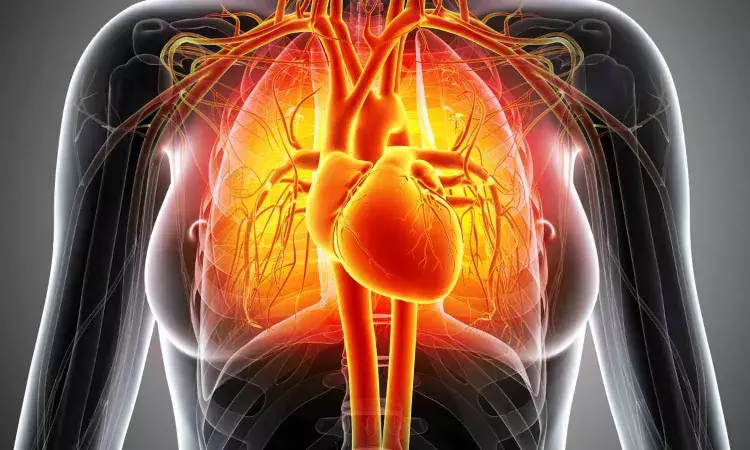- Home
- Medical news & Guidelines
- Anesthesiology
- Cardiology and CTVS
- Critical Care
- Dentistry
- Dermatology
- Diabetes and Endocrinology
- ENT
- Gastroenterology
- Medicine
- Nephrology
- Neurology
- Obstretics-Gynaecology
- Oncology
- Ophthalmology
- Orthopaedics
- Pediatrics-Neonatology
- Psychiatry
- Pulmonology
- Radiology
- Surgery
- Urology
- Laboratory Medicine
- Diet
- Nursing
- Paramedical
- Physiotherapy
- Health news
- Fact Check
- Bone Health Fact Check
- Brain Health Fact Check
- Cancer Related Fact Check
- Child Care Fact Check
- Dental and oral health fact check
- Diabetes and metabolic health fact check
- Diet and Nutrition Fact Check
- Eye and ENT Care Fact Check
- Fitness fact check
- Gut health fact check
- Heart health fact check
- Kidney health fact check
- Medical education fact check
- Men's health fact check
- Respiratory fact check
- Skin and hair care fact check
- Vaccine and Immunization fact check
- Women's health fact check
- AYUSH
- State News
- Andaman and Nicobar Islands
- Andhra Pradesh
- Arunachal Pradesh
- Assam
- Bihar
- Chandigarh
- Chattisgarh
- Dadra and Nagar Haveli
- Daman and Diu
- Delhi
- Goa
- Gujarat
- Haryana
- Himachal Pradesh
- Jammu & Kashmir
- Jharkhand
- Karnataka
- Kerala
- Ladakh
- Lakshadweep
- Madhya Pradesh
- Maharashtra
- Manipur
- Meghalaya
- Mizoram
- Nagaland
- Odisha
- Puducherry
- Punjab
- Rajasthan
- Sikkim
- Tamil Nadu
- Telangana
- Tripura
- Uttar Pradesh
- Uttrakhand
- West Bengal
- Medical Education
- Industry
Resistin Emerges as Key Predictor of Mortality and Disease Severity in Pulmonary Arterial Hypertension: Study

USA: Elevated levels of the cytokine resistin were strongly linked to a higher risk of mortality in adults with pulmonary arterial hypertension (PAH), new data from over 1,000 participants has shown.
"Our study establishes the significance of resistin in the pathobiology of human PAH. Consistent with its role observed in rodent studies, serum resistin emerges as a promising new biomarker for predicting outcomes in pulmonary arterial hypertension (PAH) and could open up new possibilities for treatment," the researchers wrote in Respiratory Research.
They added, "Machine learning-based survival models have underscored the value of incorporating resistin levels to enhance predictive accuracy."
Resistin, a cytokine produced by adipocytes, has been linked to adverse clinical outcomes in heart failure and cardiovascular disease, the researchers noted. Although studies in mice suggest that human resistin contributes to pulmonary vascular remodeling and the progression of pulmonary arterial hypertension, its potential as a biomarker for PAH is still not well-defined.
To fill this knowledge gap, Li Gao, Johns Hopkins University School of Medicine, Baltimore, MD, USA, and colleagues aimed to evaluate the potential for using the cytokine resistin as a biological and genetic marker for disease severity and survival in a large cohort of PAH patients.
For this purpose, the researchers obtained clinical, biospecimens, and genetic data for 1121 adults with PAH, including 313 with scleroderma-associated PAH (SSc-PAH) and 808 with idiopathic PAH (IPAH).
Serum resistin levels were quantified using ELISA, and their relationships with clinical variables and single nucleotide polymorphism genotypes were analyzed through multivariable regression models. Additionally, machine learning (ML) algorithms were utilized to create and evaluate risk models for predicting mortality.
The following were the key findings of the study:
- Resistin levels were significantly higher in all PAH samples and PAH subtype (IPAH and SSc-PAH) samples than in controls and had significant discriminative abilities (AUCs of 0.84, 0.82, and 0.91, respectively).
- High resistin levels (above 4.54 ng/mL) in PAH patients were associated with older age, shorter 6-minute walk distances, and reduced cardiac performance (cardiac index).
- Mutant carriers of either rs3219175 or rs3745367 had higher resistin levels.
- High resistin levels in PAH patients were also associated with an increased risk of death (hazard ratio: 2.6).
- Comparisons of ML–derived survival models confirmed the satisfactory predictive value of the random forest model (AUC = 0.70) for PAH.
The findings revealed that serum resistin can serve as a biomarker for PAH prognosis and survival in a large cohort composed solely of patients with IPAH and SSc-PAH.
"Future research should focus on creating multi-marker assays to enhance noninvasive risk stratification," the researchers concluded.
Reference:
Gao, L., Skinner, J., Nath, T. et al. Resistin predicts disease severity and survival in patients with pulmonary arterial hypertension. Respir Res 25, 235 (2024). https://doi.org/10.1186/s12931-024-02861-8
Dr Kamal Kant Kohli-MBBS, DTCD- a chest specialist with more than 30 years of practice and a flair for writing clinical articles, Dr Kamal Kant Kohli joined Medical Dialogues as a Chief Editor of Medical News. Besides writing articles, as an editor, he proofreads and verifies all the medical content published on Medical Dialogues including those coming from journals, studies,medical conferences,guidelines etc. Email: drkohli@medicaldialogues.in. Contact no. 011-43720751


